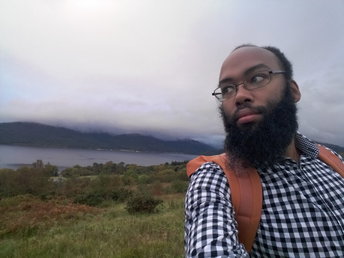
What originally drew you want to pursue composition?
As a child, I got into music in kindergarten by perfectly playing melodies back on a piano after my teacher played them. I always had a natural ear for music, and I always loved creating things; I knit, crochet, cook, bake, and growing up learning these things, I quite often bent the rules. My first improvisations happened at a young age. Then, with my first long-term piano teacher at the age of 10, I learned rudimentary music theory, which lead me to compose small pieces in the style of Chopin and Debussy (my two favorites at the time). I attended Apple Hill for chamber music camp, and composed pieces for friends there, as well as some solo piano works and a PDQ Bach-esque piece called Mozart’s Piano Concerto for Orchestra. Then, during my undergrad, a composition major student (fellow freshman) encouraged me to double major in composition, which I did, and eventually dropped the piano major. I remember during my freshman year debating whether or not I should take composing more seriously. I used to, on my own, spend about an hour or 2 in the music library after a bi-weekly class listening to music with scores. When I got to Gruppen by Stockhausen, I was COMPLETELY blown away. That was the moment where I thought to myself, I really want to do this. You’re also very active as a performer. How has your work in performance influenced your approach to composition? Or do you see these as separate practices? For the most part, I see these as separate practices. I even have a weird split personality when it comes to these different activities, often criticizing my compositions when I perform them. But nothing is totally separate, and I think some of my approach to consciously writing-in specific types of performance freedoms in my works comes from my performing personality wanting these freedoms. Additionally, my penchant for idiomaticism may also come from my own desires for idiomaticism as a performer. I have played many works by young composers, and no matter how lovely a piece may be, if the piano part is not idiomatic, I feel some level of anger … mostly at the teacher of the composer! Your music is very eclectic in terms of style and genre. Can you talk a little about where you draw inspiration, and what drives you to create the music you write? My inspiration comes mostly from my life experience. I was born in Virginia, but raised in Rhode Island, then spent significant time in Boston, then Boulder, and now I live in the Netherlands. However, I travel often, though, and I always seem to have multiple homes. This idea of multiple homes and multiple loves is really a metaphor for what and how I compose. Growing up, my dad made me love Motown, my mom made me love Gospel, my brother made me love Rap and Hip Hop, my friends made me love alternative rock and musical theater, and my own musical inclination as a pianist gravitated towards classical (from baroque to contemporary). I never had a permanent home in my musical interests, and this has translated to my own compositional interests and abilities. A quick glance at my repertoire reveals that I semi-regularly use visual art, American text, and the music or musical ideas of past composers for influence. I also like to use stories or ideas from marginalized communities, stories from past unsung heros, and I am now beginning to explore my own queer identity in my music and performances. I always hear a sensitivity and attention to timbre and instrumental color in your music (thinking specifically about Nicht Zart II: Hommage a Scelsi and Ohkyanoos). Is this a particular concern of yours during the composition process, or is it more a bi-product of counterpoint and instrumentation? Or something else entirely? This is a BIG concern of mine, and it makes me so happy that you pointed this out! In fact, during my music theory tutelage at BU and NEC, the relationship between orchestration/instrumental color/timbre and the overall musical journey of a piece was rarely discussed. When it was discussed, the teacher was a composer teaching a focused theory class or one of my private composition teachers. I guess I subliminally became frustrated with this lack of attention to color on an academic level, and said to myself, “what would happen if I stopped paying attention to rhythm, and focus almost obsessively on color?” This lead to me creating a type of notation (admittedly based on Lutoslawski’s box notation) that allows for a certain type of color manipulation, which you can hear in pieces like Midnight and the taking-in or 3 groups. This type of hyper-attention to color freed me up to compose the pieces that you mentioned above. Your bio places a great deal of emphasis on the importance of social justice and awareness in your music. Can you talk a little bit about what that means to you and how it manifests in your work as an artist? I have always been a political person, and my attention to and discussion of politics increased exponentially during my freshman year. I think 9/11 had a big impact on artists in that way, and even though 9/11 happened during my senior year of high school, the event was still discussed and argued over will into my senior year (and even to this day, for that matter). I remember hearing all of these 9/11 tribute pieces where a solo instrument or a chamber group would play pretty music, and I guess the listeners were supposed to be moved. I remember listening to tributes by more famous composers that took a similar approach, and I was left frustrated and empty. I wanted to be challenged. I wanted to be provoked. So, in 2004, I wrote my own 9/11 tribute piece, which was about the first world trade center bombing in 1993. It was around this time that I realized the power that music could have in conveying the gravity and the other complex identities of injustice, and since then that is how I have used music for social justice. You have a particular approach to creating music that is socially and politically engaging in which there is a clear statement, but I find is much more reflective and inquisitive than declarative of any position/thought. Is this intentional on your part? Definitely. When something important happens, it is easy to hear the story on the radio, read about it in the newspaper, online, or on social media, see it on the news, and just let it slip into the bromide of daily life. But certain things stick out to me. They gnaw at me. They scream at me to try to do something. And when I embark on a social justice project, it involves research, interviewing, intimating, imagining myself in another person’s shoes, arguing, writing … it is a process until I feel I am intellectually and emotionally ready to comment. Because I go through all this work, I want my audiences to have both an emotional and an intellectual experience. I like it when people think. I think people should think more, and music should make people think more. Especially social justice music. Can you also talk about your work with Castle of Our Skins - what is it, what is your involvement, etc.? Castle of our Skins is a concert and educational series organization dedicated to celebrating Black artistry through music. We produce educational programs as well as large-scale concert productions, community concerts, and other activities related to our mission. We also have had a research residency at the Center for Black Music Research in Chicago, and a college residency at Gettysburg College, and we are about to have another college residency at Brandeis University (sponsored by Music Unites Us) centered around the theme of being (musically) Black in Europe and Beyond. I am a co-founder, associate artistic director, composer-in-residence, and an occasional pianist. I have also given lectures to adults and younger students about the lives and music of Black composers, and composed the musical component to our most successful educational program entitled A Little History, which teaches children about the lives of 9 legendary figures of Black history through music. This year marks our fifth season, and it shows no signs of stopping! Much of my social justice work happens through Castle of our Skins, and creating this organization was a big step in coming into my own identity. It is the sole reason why I came to realize the severity of the lack of young, Black composers being represented in new music today, which is why I truly believe that my own existence is rare and - in many ways - an act of social justice. Do you have any interesting current or upcoming projects? Oh yes! I am very excited to be part of counter-tenor Carl Alexander’s Voic(ed) Project (https://voicedproject.com), where 15 Black composers have been commissioned to compose works that incorporate Mr. Alexander’s voice in some way. This project could benefit from grassroots fiscal support, and donations can be made here: https://voicedproject.com/support/ For this project, I am composing a work entitled Empathy I: Diamond Reynolds, which uses words that she said after her late partner Philando Castile was murdered. In January 2018, the tenor Anthony P. McGlaun (http://anthonypmcglaun.com) will premiere a new work for tenor and piano quartet called … her phantom happiness … , which uses poetry by Georgia Douglas Johnson. In Feburary 2018, I will attend the Escape-to-Create residency to focus on some song cycles I am composing in the big three European languages. I will start with the German cycle, which uses text by Louise Otto-Peters (https://en.wikipedia.org/wiki/Louise_Otto-Peters). During this residency, I will also give a community lecture and a concert featuring the music of Black composers. In the fall of 2018, NOISE-BRIDGE (http://noise-bridge.com) will premiere a commissioned work for voice, clarinets, and objects. This mega work (about 30 minutes) will be based on 9 visual artists and our (me and the ensemble) personal responses to these artists. Each of us will select three artists and respond to them in some way, and I will use the material to create a work. This will be one of my most exciting, collaborative works to date. I also have some performance projects/collaborations coming up, performing works by Renee Baker, Robert Schumann, and Ed Bland. And the inevitable final question, what are the top 5 pieces/songs that have had the most influence on your work as a musician? TOO MANY!! :-D If I were to pick a top five though … perhaps …
For more information about Anthony Green check out his website Below are some samples of Anthony's music
0 Comments
Leave a Reply. |
Early Reflections contains interviews with emerging and currently active composers. Check out the archives to see a list of previous interviewees!
Full Directory of Interviews |

